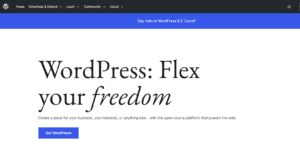Table of contents:
- Best CMS solutions: A Comparison of WordPress, Shopify, Wix, Joomla, and Drupal
- An Overview of CMS Solutions: WordPress, Shopify, Wix, Joomla and Drupal
- Pricing and Costs of Different CMS Solutions
- Conclusion: Making an Informed Choice for Your Website’s CMS Solution
Best CMS solutions: A Comparison of WordPress, Shopify, Wix, Joomla, and Drupal
In this article, we will explore a comparison of five leading Content Management System solutions in 2023 – WordPress, Shopify, Wix, Joomla, and Drupal. By the end of this article, after looking at their advantages, disadvantages, and costs, you’ll be equipped to make an informed choice that lines up with your website development goals.
The importance of selecting the right CMS for website development
In today’s ever-changing landscape, having a website is crucial for any business. However, building a website can be difficult for most business owners, let alone managing it. That’s when the right Content Management System proves it value and usefulness.
What is a Content Management System?
A CMS is a software app that allows website owners and admins to generate, edit, publish, and delete content from their website without the need of web development skills and knowledge. Essentially, an ideal CMS streamlines the website’s creation and management processes, all while saving time and costs.
Selecting a suitable Content Management System (CMS) for developing a website can be a challenging decision that can impact the success of your digital presence.
How to choose the right Content Management System?
When evaluating different CMS solutions, it’s crucial to carefully evaluate these key elements:
- User-Friendly Content Management: A user-friendly CMS should make it simple for non-technical users to add, edit, and delete content without requiring coding knowledge. This helps individuals to maintain a relevant website without depending on developers for every update or issue.
- Scalability and Flexibility: As your business grows and evolves, your website must adjust to those changes. A good CMS should offer you the option of adding more pages, features, or sections to your website to accommodate your business’ needs and changes. With a flexible CMS, these changes should be made possible without disrupting the structure and the design of the website.
- SEO-Friendly: A good CMS comes with plugins and tools that can help optimise your website or search engines. An SEO-friendly CMS makes it easy to optimise specific SEO elements that can improve your website’s visibility, attract more organic traffic, and achieve better search engine rankings.
- Security: Security is of the utmost importance in the digital landscape. A reputable CMS will provide regular updates and security patches to protect your website, your users, and your visitors from cyber threats.
- Cost-Effectiveness: When choosing a CMS, it is crucial that your budget aligns with the associated costs. While some CMS platforms are open-source and free, but others might have licensing or subscription costs. Carefully evaluate those costs in relation to your budget and needs to make the right choice.
An Overview of CMS Solutions: WordPress, Shopify, Wix, Joomla and Drupal
WordPress
WordPress is the most popular CMS. It powers 43.1% of all websites that exist on the internet. This content management system is an open-source platform that makes it easy for its users to manage and create websites.
Pros:
- Wide range of plugins and themes for customising your website.
- Flexibility and freedom to create any type of website desired.
- Great section of SEO plugins and user-friendly features.
- Intuitive platform, easy to use for beginners and experienced developers alike.
- Scales from simple blogs to complex websites (e.g., membership, E-Commerce).
- Offers maintenance.
Cons:
- Requires regular updates for security and performance.
- Some customisation themes and plugins on WordPress come with a cost.
Shopify
Shopify is an e-commerce platform that simplifies the process of setting up and maintaining online stores. With a total of 4% of websites on the internet powered by it, this platform offers customisable templates, secure payments, and great marketing tools and features.
Pros:
- E-commerce focused.
- Multiple extensions and themes.
- No need for an upgrade if your profit goes over a certain amount.
- 24/7 customer support on top of online resources.
Cons:
- Costs can pile up due to subscription fees and third-party app expenses.
- Limited apps and customisation options.
Wix
Wix is a beginner-friendly website builder that offers a wide range of tools and templates. Websites can be built without coding skills and expertise with this CMS platform. A total of 2.5% of the total websites on the internet were built with Wix.
Pros:
- Drag and drop interface that makes building websites an effortless process.
- Varied array of templates from various industries that are customisable.
- Hosting and domain services within the platform.
Cons:
- Compared to other CMS platform, Wix has a limited flexibility.
- Migrating to other platforms can be difficult.
- Paid plan required for E-Commerce store and custom domain.
Joomla
Joomla is another open-source CMS platform that powers a total of 1.8% of websites on the internet. Joomla is capable of being used to create a wide range of websites, from personal blogs to more complex platforms like corporate portals and online communities.
Pros:
- Multi-language support for creating multilingual websites.
- Community support for themes, templates, and extensions.
- Flexibility and plenty of options to choose from when building a bespoke website.
Cons:
- Might present some challenges for beginners.
- Fewer themes and templates compared to other CMS options.
- Installation of numerous extensions could lead to compatibility issues.
Drupal
Drupal is a robust CMS platform, often chosen for large-scale and complex websites. It is mostly known for its flexibility and ability to handle a lot of data. It powers a total of 1.1% of the total number of websites available on the internet.
Pros:
- Strong focus on security and access control.
- Scales extremely well for handling high traffic and complex data.
- Flexibility and control over the design of the website.
Cons:
- Requires a significant amount of time, effort, and practice to master.
- More difficult to use compared to WordPress and Joomla.
- Might present some challenges on how to change the appearance of the website.
Pricing and Costs of Different CMS Solutions
WordPress
WordPress is an open-source platform and free to use.
However, you will need to pay for web hosting, which can vary in price depending on the hosting provider and plan you choose. Additionally, there might be costs associated with premium themes, plugins, and third-party tools.
Shopify
Shopify is a subscription-based platform with multiple pricing tiers.
It includes hosting in its plans, so no separate hosting costs are required. Additional expenses might include premium themes, apps, and transaction fees for using external payment gateways.
Wix
Wix offers both paid and free plans.
Paid plans provide more features and customization options. Hosting is included in Wix plans. Premium plans, domain registration, third-party app costs, and upgrades to access advanced features are some potential extra fees.
Joomla
Joomla is an open-source platform and is free to use.
Similar to other CMS platforms, you’ll need to pay for web hosting. Costs may include premium templates, extensions, and plugins.
Drupal
Drupal is also open-source and free to use.
Like other platforms, hosting costs are a consideration. Expenses can include premium themes, modules, and professional services for customisation.
Conclusion: Making an Informed Choice for Your Website’s CMS Solution
In this comparison of WordPress, Shopify, Wix, Joomla, and Drupal, we’ve investigated the pros, cons and costs of each CMS. Let’s quickly recap the main takeaways:
User-Friendly: WordPress, Wix, and Shopify stand out for their user-friendly interfaces, making them great choices for beginners.
E-Commerce Focus: While all the platforms have E-Commerce compatibility, Shopify is the preferred platform for creating and managing online stores.
Customisation and Flexibility: WordPress, Joomla, and Wix provide extensive customisation options, enabling you to tailor your website to your specific needs.
Scalability: WordPress, Drupal and Joomla offer robust scalability for complex and large-scale websites.
SEO-Friendly: WordPress leads the way with a variety of SEO plugins and user-friendly features.
Security: All these platforms prioritise security, but Drupal’s focus on access control makes it stand out.
Each of these Content Management Systems has its strengths and is suited for different types of websites. Before making a decision, we encourage you to evaluate your specific needs, preferences, budget constraints, and long-term goals.
However, as you go through this decision-making process, it’s worth noting that WordPress has emerged as a leading CMS choice for a vast number of benefits and advantages.
To learn more about why WordPress is the popular CMS choice for many, we invite you to explore our dedicated page, where we delve into the reasons behind its popularity and success.
Resources
W3tech – Yearly trends in the usage statistics of content management systems







